- Home
- Technical Cooperation Projects
- Index of Countries
- Africa
- Tanzania
- Technical Cooperation Project in Strengthening Participatory Planning and Community Development Cycle for Good Local Governance (O&OD Project) Phase 2
- Project News
- Vol.4: Community Facilitator Training Conducted in Target Villages of Kondoa District
Project News
2015-10-16
Vol.4: Community Facilitator Training Conducted in Target Villages of Kondoa District
Background of the Training
The project conducted Community Facilitator Training in Kondoa District, Dodoma Region, from June 29 to July 7, 2015.
The target villages of the project in Kondoa District are Mnenia Village, Mnenia Ward and Mkurumuzi Village, Kikore Ward. Kondoa District embarked on introducing "Improved O&OD[1]" in January 2014. Until recently, Ward Facilitators[2] have been working on community facilitation in order to transform the norms of the community leaders and to develop organizations in the target villages. From now on, the aim is for the community people themselves to be able to facilitate the norm transition and organization strengthening of their own community, with assistance from the Ward Facilitators. As the first step of this endeavour, four villagers (2 females and 2 males) from each sub-village were selected as Community Facilitators. Community Facilitator Training was then organized as the first opportunities for them to experience community facilitation, using "drama facilitation."
Drama Facilitation
In Tanzania, drama has been used to pervade national policies across the country down to the community level since its independence. Today, drama remains to be used actively by the government, local and international development organizations and NGOs for awareness building or educational campaigns to spread the knowledge of particular themes such as HIV/AIDS.
The purpose of using drama facilitation for our Community Facilitator training, however, was not only to "educate" people. The trainees, who are the Community Facilitators of the target villages, became both the playwrights and the performers of their own drama. They chose their community's felt problems, which they found through dialogues with the community people, as the main theme of their drama. Reflecting on the dialogue with the people, the Community Facilitators and the village leaders discussed on how to understand and express the relationship between the community people and their felt problems, and developed the script of the drama together. The trainees were asked to try to develop the scenario and the performance in the way that the community people would start to think about their felt problems and discuss the solutions after watching the drama. This process of script building became the opportunity for the Community Facilitators to discuss the development issues with their neighbours through casual conversations, to communicate with the community people with "problem finding" in mind, and to have discussions with the village leaders to analyze their actual situation and come up with solutions. All these are activities expected for Community Facilitators to carry out daily.
Proceedings of the Training
<Day 1>
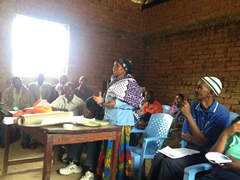
The trainees learned the basics of drama facilitation and expected roles of Community Facilitators through presentations from the trainers[3] and discussions among the participants.
The picture shows a female community facilitator of Mkurumuzi Village contributing to the discussion.
<Day 2>
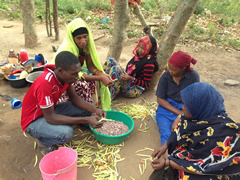
In order to find out the issues that the people actually feel the need to address the most, the trainees visited the sub-villages. They visited households and talked to the villagers as casually as possible in order to grasp the genuine opinions and feelings.
The picture shows Community Facilitators in Mkurumuzi Village having casual conversations with female villagers while helping them with their daily duties. Because the majority of the villagers are Muslims in this village, mothers were preparing "futari," the meal taken after sunset during the Ramadan fasting period.
<Day 3>
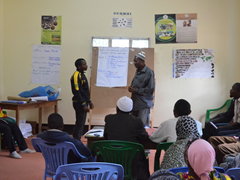
Based on the information collected from the sub-villages on Day 2, participants developed the script of their drama. In Mnenia Village, "Health" (Community Health Fund), "Water" and "Shortage of Food" were chosen as their themes. After deciding on the basic scenario and the performers of each scene, the trainees improved their lines and performance by repeating to practice, present and give comments to each other.
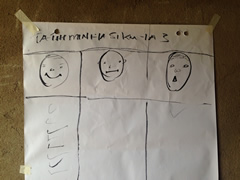
Every day, at the end of the training session, trainees evaluated themselves by using the table shown in the picture. In the beginning of the training session every morning, participants reviewed the sessions of the previous day by discussing the reasons behind the chosen facial expression on the table.
<Day 4>
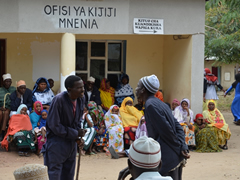
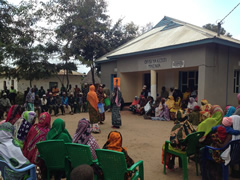
As the trainees were working on their final practices, the villagers who were informed of the performance before hand started to gather outside the village office. It was finally the time for them to present what they have been developing and practicing for the past couple of days. Tanzanians are usually very fond of drama performances. The response from the audience to the Community Facilitators' performance was positive, and the crowd erupted into gales of laughter many times. It seemed that the development issues expressed in the drama was something that the villagers could strongly relate to.
How will the Community Facilitators utilize the experience they gained from this training? It is up to the commitment and creativity of Ward Facilitators, village leaders and the Community Facilitators themselves. We look forward to seeing the positive change in the village in the near future, with the new kind of community facilitation derived from this training in place.
Notes
- [1] Please see the "Outline of the Project"
- [2] Selected extension officers at the Ward level trained as facilitators by the project. Please see the Project News Vol. 2 for the details of the Ward Facilitator training.
- [3] For more stories on the trainers of this training, please see the next Project News (LINK to HOMBOSAMA article)
- About JICA
- News & Features
- Countries & Regions
- Our Work
- Thematic Issues
- Types of Assistance
- Partnerships with Other Development Partners
- Climate Change / Environmental and Social Considerations
- Evaluations
- Compliance and Anti-corruption
- Science and Technology Cooperation on Global Issues
- Research
- JICA Development Studies Program / JICA Chair
- Support for the Acceptance of Foreign HRs / Multicultural and Inclusive Community
- Publications
- Investor Relations
